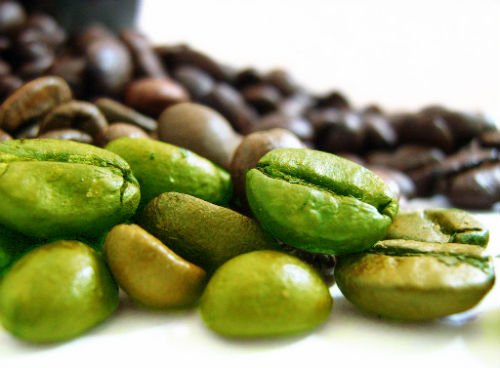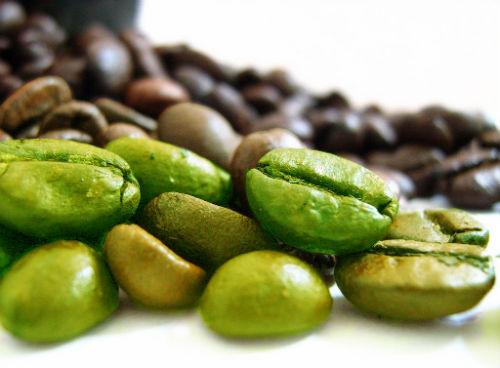
The supplement industry is in a tough spot when it comes to weight loss, because it’s really damn hard to take a supplement to lose weight, and it’s even harder to sacrifice profits to rid people of their false beliefs.
Being overweight is the result of a variety of feedback loops that have gone awry, so there’s no food you can eat that actually targets excess fat tissue to any extent.
If there was you can bet big pharma would be all over that. They’ve probably spent close to half a trillion dollars trying. But still nothing close.
But in the supplement industry there are two products that are extremely popular when it comes to weight loss: raspberry ketones and green coffee bean extract.
Even the mighty Dr. Oz has sung their praises.
Do they live up to their promise?
NO! Let me explain why………
What They Really Are
Green coffee beans and raspberry ketones are actually quite simple. In fact, green coffee beans are so simple that you’ll be surprised when you find out what they really are.
They’re coffee beans that haven’t been roasted yet. That’s it. Unroasted coffee beans. An entire weight loss cottage industry has formed around a slightly unprocessed version of a food that’s been eaten for millennia.
Raspberry ketones are a little more unique. It’s similar in structure to capsaicin (the ingredient in peppers that makes them spicy) and give raspberryies their scent. Trace amounts of raspberry ketones have been used for centures in perfurmes and dyes, but it was always cost prohibitive to make from natural sources.
As a supplement raspberry ketones weren’t possible until the late 90’s when it was discovered they could be made through a synthetic process.
What They Purportedly Do
Raspberry ketones and green coffee beans exert their effects in different ways. Green coffee beans are supposed to limit sugar metabolism, and there’s truth to this. Coffee is a well studied as a nutrient, and it contains three compounds called caffeic acid, caffeoyl quinic acid and chlorogenic acid which limit glucose uptake in the bloodstream and the expression of some genes that regulate fat metabolism.
Raspberry ketones accelerate fat loss by increasing the activity of a neurotransmitter called norepinephrine and by altering the activity of an important enzyme called lipase which regulates fat metabolism. What, if anything raspberry ketones do for fat loss over the long run is a complete mystery.
Where Did Their Reputation Come From?
It’s a bit of a curiousity how unroasted coffee beans and a substance previously only used in perfume and air purifiers have become the de facto compounds people use to take weight.
When it comes to green coffee beans, I think the rage started when Dr. Oz talked about them on his show in this episode:
Apparently he’s rambled on about raspberry ketones as well. I don’t know.
As for other sources, there are a few more reputable ones.
For greeen coffee beans there are a number of studies that have examined the ability of caffeic acid to limit glucose uptake. Here’s more. There are also some clinical studies that have shown people lose weight when they take it for a few weeks.
The literature on raspberry ketones is much more vague and hypothetical. There are some experiments which show it increases fat metabolism and helps reduce weight in mice.
However, there are some important things to consider when taking this all in.
Namely:
1). All the weight loss stuff was done on very small groups of people. It amounts to “hey, take this stuff for a few weeks and see what happens.” I’ve written before how these sorts of results are not useful.
2). Caffeic acid is found in all sorts of plants, not just green coffee beans. And more importantly, it’s found in regular ol’ coffee. Most of its purported health benefits were done when studying regular coffee beans. There’s nothing really special when it comes to green coffee beans and its active constituents….you can find them all over. Including Starbucks.
3). You can’t always trust Dr. Oz.
4). All this is really no different than lots of other healthy foods. If you drink a lot of green tea for several years it’ll probably help you lose weight. Same for cutting back on sugar. Same for going vegetarian. And same for….you get the idea.
Probably Healthy For You, Nothing Special
Both of these compounds have health benefits that fit neatly within the greater diversity of plant nutrients you can eat. They seem to help certain cellular functions, they seem to help scavenge free radicals, and seem to be fairly unique, mostly because most micronutrients are inherently diverse. That’s all fine, but not worthy of your disposable income. Just eat a damn salad.
The Real Reason They’re So Popular
Both of these supplements have two things going for them:
1). They have reported health benefits that pertain to fat loss (albeit with some truthiness)
2). They’re cheap.
I know this from first hand experience in my dealings with suppliers. The synthetic process for creating raspberry ketones allows them to be made very inexpensively (about 100-1000x less than naturally derived ketones) and green coffee beans are one of the most intensively farmed foods on the planet.
Their high-value use to customers and low product cost make them a very high margin item, and supplements are quickly becoming a low margin industry.

Jonathan,
Interesting take on the whole green coffee bean extract debate, so thanks for that. My question is a bit unrelated to this post, so you’ll have to forgive me for that. I wanted your opinion on diet supplements that contain black pepper extract; apparently, the word out there is that anything with black pepper extract leads to better supplement absorption and thus better weight-loss results. What do you have to say to this?
Alana
LikeLike
Alana,
Sorry, but I really don’t know very much about black pepper extract. I’ve never heard anything about those particular claims, so unfortunately…..I can’t be much help. Sorry 😦
LikeLike
[…] previously wrote about the legitimacy (or lack thereof) of green coffee bean extract and raspberry ketones for weight loss. Doing so made me curious about the other heavy hitter in weight loss supplements: Garcinia […]
LikeLike
Hi there.. I recently bought the green bean and coffee extract supplement and have noticed a better more improved metabolism and my weight doesn’t go up at all, just lower or consistent. Which is great I think! But what are the risks of taking these pills?
Can it have any health risks on your body over a time period?
LikeLike
Green coffee weight loss
Green Coffee Bean Extract and Raspberry Ketones: Myth and Reality
LikeLike
green coffee bean extract weight loss
Green Coffee Bean Extract and Raspberry Ketones: Myth and Reality
LikeLike
Thanks for this article and your blog (FYI the link to the green coffee bean study (Vinson et al) shows it was retracted in 2014). Even though I have a PhD in Biology I still find myself tempted by weight loss supplements (and donuts, unfortunately). I appreciate you doing all the research to find out if there is any truth to the claims. Many other blogs out there do not provide links to peer reviewed studies.
LikeLike
Heather,
Thanks for this compliment! What’s your area of specialty in biology?
Thanks for the heads up too, I usually don’t have time to go over journal articles after I’ve put them up, so the proofreading is appreciated.
I find controlling the glycemic load of your diet is probably one of the most straightforward ways to watch your weight without falling into gimmicks.
Have a great day!
LikeLike
My research was in plant-insect ecology and evolution. I am no expert in human biology, although I know enough to know you are right about watching glycemic load – no shortcuts, just good old fashioned moderation. Should be easy, right?
LikeLike
Hey, Wow all the posts are very informative for the people who visit this site. Good work! We also have a Blog/site by name Simply herbal which covers Health related products. Please feel free to visit our site. Thank you for sharing.
Green Coffee Bean
Keep Posting:)
LikeLike